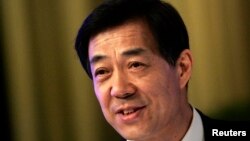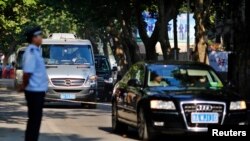BEIJING —
China is showcasing this week’s trial of disgraced politician Bo Xilai as part of a larger crackdown on corruption. But political analysts see the trial quite differently. They say that although the case addresses some wrongdoing, the build up to the trial has appeared to be more of a political bargaining game than a true effort to stamp out widespread official graft.
The trial of one of China’s most popular and flamboyant politicians, Bo Xilai, begins early Thursday in the eastern coastal city Jinan. It will be held away from China’s political nerve center of Beijing and far from Bo’s last stronghold, the southern metropolis of Chongqing.
Chinese state media say the trial is part of Chinese President Xi Jinping’s “high-voltage” crackdown on corruption, and that it shows that no one is above the law.
Political analyst Hu Xingdou says a closer look at the charges against Bo tells a different story.
“Bo Xilai's case is very complicated, in it there are problems of corruption, and there is also political struggle and struggles of power," said Hu. "The trial mainly deals with the corruption charges, but in reality it is likely that he committed other crimes.”
Bo’s political scandal exploded last year by revelations that his wife murdered a British businessman. Both his wife and the former police chief from Chongqing have already been sentenced.
When Bo was expelled from the party, the allegations against him were far-reaching and more specific.
Last September, state media said a party investigation found him guilty of six alleged crimes that spanned his political career - from his mayorship in Dalian, to governor of Liaoning, as Commerce Minister in high-ranking party positions and as party chief in Chongqing.
Among the charges was his abuse of power and attempt to cover up his wife’s murder of Neil Heywood. He also allegedly used his government and Communist Party positions to benefit others. In return, he received large sums of cash and assets through his family members, according to the investigation.
2012
2013
In July, however, when Jinan prosecutors announced Bo’s indictment, only the three general crimes of bribe taking, corruption and abuse of power were named. His corrupt acts allegedly occurred during his time as mayor of Dalian.
No specific details were given, and there was no mention of the alleged cover-up of his wife’s murder of Heywood. Media reports have suggested that the sum of the bribes he received amounted to 25 million Chinese yuan or $4 million.
Historian Zhang Lifan said the government is making greater use of charges of an economic nature.
“Bo Xilai's case is a political one, but from the charges against him, we can see they are using economic charges to handle a political case," said Zhang. "And besides that, the amount of bribes they are talking about is only 25 million Chinese yuan [$4 million]. With such a small sum like that, it is hard to show the government is cracking down on corruption because it is possible that the corruption of most families of high officials surpasses that amount.”
Political analyst Hu Xingdou said low-balling (understating) the amount of funds he received also helps avoid raising questions that might make the Communist Party uncomfortable.
“If they openly said the amount of his bribes equals hundreds of millions, they would give the Chinese public negative associations," said Hu. "They might think that if a senior leader can be so corrupt, then what about the rest?”
Most analysts believe that Bo will likely be imprisoned for 15-20 years for his crimes. They say the reason why his crimes have seemingly shrunk is to keep the court from giving him a stiffer sentence.
Willy Lam, a political scientist at the Chinese University of Hong Kong, said the situation indicates that Chinese President Xi Jinping has struck a deal among the party’s factions over the trial.
Lam said that while the compromise shows that Xi has the political skills to navigate party factions, it has raised questions about his ability to tackle graft.
“The fact that the Bo Xilai trial is just a public relations exercise demonstrating a facade of unity amongst the factions, I think, reflects very poorly on Xi Jinping's leadership ability to really fight corruption, which everyone agrees is the most serious problem in the party,” said Lam.
Since stepping into office, Xi has trumpeted a crackdown on graft. But so far, few high-ranking officials have been prosecuted.
Zhang Lifan said that if the president was to truly take on corruption that could be a serious threat to his own power.
“I think that if he wanted to really fight corruption, because the system at the moment is of widespread corruption, if he really wanted to fight corruption then everyone [other leaders] would probably join together to get him out of office,” said Zhang.
Analysts say that if Xi wants to succeed, he needs to do more to lay to rest accusations of the privileges of China’s political elite and promote policies that lessen the gap between the rich and poor.
He also needs to promote the rule of law, they say, something the trial of Bo shows is not forthcoming in China.
The trial of one of China’s most popular and flamboyant politicians, Bo Xilai, begins early Thursday in the eastern coastal city Jinan. It will be held away from China’s political nerve center of Beijing and far from Bo’s last stronghold, the southern metropolis of Chongqing.
Chinese state media say the trial is part of Chinese President Xi Jinping’s “high-voltage” crackdown on corruption, and that it shows that no one is above the law.
Political analyst Hu Xingdou says a closer look at the charges against Bo tells a different story.
Bo Xilai Bio Box
Bo Xilai- Father Bo Yibo was one of the founders of the People's Republic of China
- Bo Xilai joined the Communist Party in 1980
- Was mayor of Dailan, governor of Liaoning province and commerce minister
- Named leader of Chongqing city in 2007 and ascended to membership in the Politburo
- Gained prominence for launching crackdown on corruption in Chongqing
- Expelled form Communist Party in September, 2012
- Found guilty of bribery, corruption and abuse of power in September, 2013, sentenced to life in prison
Bo’s political scandal exploded last year by revelations that his wife murdered a British businessman. Both his wife and the former police chief from Chongqing have already been sentenced.
When Bo was expelled from the party, the allegations against him were far-reaching and more specific.
Last September, state media said a party investigation found him guilty of six alleged crimes that spanned his political career - from his mayorship in Dalian, to governor of Liaoning, as Commerce Minister in high-ranking party positions and as party chief in Chongqing.
Among the charges was his abuse of power and attempt to cover up his wife’s murder of Neil Heywood. He also allegedly used his government and Communist Party positions to benefit others. In return, he received large sums of cash and assets through his family members, according to the investigation.
Timeline of the Bo Xilai Scandal
Timeline of the Bo Xilai Scandal2012
- February 2: Bo's key ally and Chongqing police chief Wang Lijun is demoted
- February 6: Wang visits U.S. consulate in Chengdu
- March 15: Bo dismissed as Chongqing party chief
- March 26: Britain asks China to investigate November death of Briton Neil Heywood in Chongqing
- April 10: Bo suspended from Communist Party posts. China says Gu is being investigated for Heywood's death
- August 20: Gu given suspended death sentence after confessing to Heywood's murder
- September 24: Wang convicted of defection, power abuse and bribe taking
- September 28: Communist Party expels Bo
2013
- July 25: Bo indicted for bribery, corruption, abuse of power
- August 22: Bo trial begins in Jinan
- September 22: Bo sentenced to life in prison
No specific details were given, and there was no mention of the alleged cover-up of his wife’s murder of Heywood. Media reports have suggested that the sum of the bribes he received amounted to 25 million Chinese yuan or $4 million.
Historian Zhang Lifan said the government is making greater use of charges of an economic nature.
“Bo Xilai's case is a political one, but from the charges against him, we can see they are using economic charges to handle a political case," said Zhang. "And besides that, the amount of bribes they are talking about is only 25 million Chinese yuan [$4 million]. With such a small sum like that, it is hard to show the government is cracking down on corruption because it is possible that the corruption of most families of high officials surpasses that amount.”
Political analyst Hu Xingdou said low-balling (understating) the amount of funds he received also helps avoid raising questions that might make the Communist Party uncomfortable.
“If they openly said the amount of his bribes equals hundreds of millions, they would give the Chinese public negative associations," said Hu. "They might think that if a senior leader can be so corrupt, then what about the rest?”
Most analysts believe that Bo will likely be imprisoned for 15-20 years for his crimes. They say the reason why his crimes have seemingly shrunk is to keep the court from giving him a stiffer sentence.
Willy Lam, a political scientist at the Chinese University of Hong Kong, said the situation indicates that Chinese President Xi Jinping has struck a deal among the party’s factions over the trial.
Lam said that while the compromise shows that Xi has the political skills to navigate party factions, it has raised questions about his ability to tackle graft.
“The fact that the Bo Xilai trial is just a public relations exercise demonstrating a facade of unity amongst the factions, I think, reflects very poorly on Xi Jinping's leadership ability to really fight corruption, which everyone agrees is the most serious problem in the party,” said Lam.
Since stepping into office, Xi has trumpeted a crackdown on graft. But so far, few high-ranking officials have been prosecuted.
Zhang Lifan said that if the president was to truly take on corruption that could be a serious threat to his own power.
“I think that if he wanted to really fight corruption, because the system at the moment is of widespread corruption, if he really wanted to fight corruption then everyone [other leaders] would probably join together to get him out of office,” said Zhang.
Analysts say that if Xi wants to succeed, he needs to do more to lay to rest accusations of the privileges of China’s political elite and promote policies that lessen the gap between the rich and poor.
He also needs to promote the rule of law, they say, something the trial of Bo shows is not forthcoming in China.









